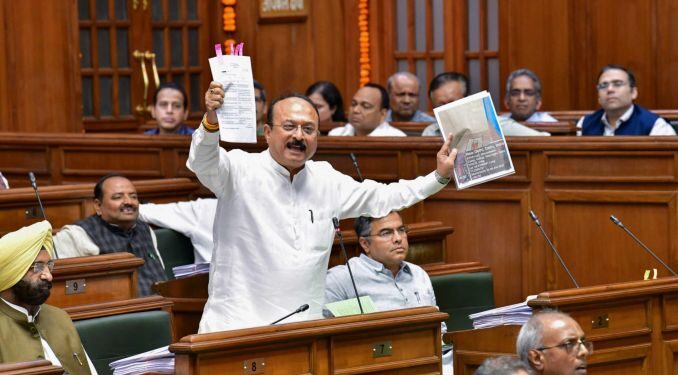The Delhi government on August 5 introduced the Delhi School Education (Transparency in Fixation and Regulation of Fees) Bill, 2025 during the ongoing Monsoon Session of the Legislative Assembly. First announced in April following a major controversy over fee hikes by private schools, the bill is now under heated debate for its long-term impact on school fee structures, financial transparency, and parental rights. Voting on the bill and its proposed amendments is expected in the coming days.
The Aam Aadmi Party (AAP), now in opposition, has demanded that the bill be referred to a Select Committee for more detailed scrutiny and broader stakeholder consultation.
“Rushing such a sensitive bill without adequate stakeholder input risks harming students and parents alike,” said former Deputy CM and Education Minister Manish Sisodia during the Assembly session.
The bill introduces a three-tier regulatory framework aimed at increasing transparency in how private schools hike fees, while simultaneously allowing institutions to raise fees by up to 15% annually without seeking prior external approval. This provision has drawn sharp criticism from parent groups and opposition leaders who warn it could pave the way for unchecked and arbitrary fee hikes. A key point of contention is a clause mandating the backing of at least 15% of parents to lodge a formal complaint against a school’s fee-related decisions. Critics argue this places an undue burden on individual families and effectively suppresses legitimate grievances.
The three-tiers are—School-Level Committee (includes school management, teachers, and randomly selected parents); Zonal Fee Regulatory Committee (handles appeals and disputes) and State-Level Regulatory Authority (Final decision-maker for complex cases). According to the bill, schools must submit a three-year fee proposal with financial documents. Audited financial disclosures are required before proposing hikes.
The bill contains a controversial clause that requires support from 15% of parents to file a complaint, which is seen as a barrier to individual grievances. Penalties for Non-Compliance fines ranging from ₹1 lakh to ₹10 lakh; possible de-recognition or government takeover of schools and ₹50,000 fine per student for harassment or denial of admission due to fee issues.
While the government argues that the bill is a step toward greater transparency and regulation in private education, the debate over whether it empowers parents or schools more remains unresolved. The Aam Aadmi Party (AAP), now in opposition, has called for the bill to be sent to a Select Committee for detailed review and broader consultation. “Rushing such a sensitive bill without adequate stakeholder input risks harming students and parents alike,” said former deputy CM and education minister Manish Sisodia during the Assembly session.
AAP MLAs have also questioned the timing of the bill, pointing out that a more robust fee regulation mechanism already existed under the 2015 AAP government’s policy, which included mandatory financial audits and allowed individual complaint filings.
“This new bill dilutes the safeguards we had built for parents and students. It shifts the burden onto families instead of ensuring real transparency from schools,” said AAP MLA Atishi.
AAP has formally moved a motion to refer the bill to a Select Committee for revisions, warning that passing the bill without amendments would be a “setback for affordable and equitable education in Delhi.”
As the bill awaits voting, the debate continues over whether it strikes a balance between regulation and autonomy, or tilts power disproportionately in favor of private institutions.
Comparison with Previous Laws
| Feature | 2025 Bill | 2015 Bill (AAP Govt) | Delhi School Education Act, 1973 |
| Fee Regulation | Three-tier system with school, zonal, and state-level committees | Single committee headed by retired judge | No structured fee regulation |
| Parental Involvement | Parents part of school-level fee committees | No direct parental role | Minimal parental input |
| Audit Requirement | Financial disclosures required, but audit certification optional | Mandatory audit of school accounts | No audit mandate |
| Complaint Mechanism | Requires 15% of parents to file a complaint | Individual complaints allowed | No formal grievance redressal |
| Court Access | Limited civil court access; internal redressal preferred | Civil court access retained | Civil litigation possible |
| Retrospective Fee Rollback | Not applicable | Allowed rollback of excess fees | No rollback provision |
Potential Benefits & Concerns
- Greater Transparency: Parents can review fee structures before admission.
- Predictable Fee Hikes: Annual cap of 15% may help families plan better.
- Empowered Parents: Inclusion in committees may foster trust in school governance.
- Higher Initial Fees: Schools may front-load fees within the 15% cap.
- Reduced Flexibility: Schools may hesitate to offer discounts or scholarships due to rigid fee structures.
Impact on School Budgeting
- Three-Year Fee Planning: Schools must submit a forward-looking budget with detailed financials.
- Audit & Disclosure: Even without mandatory audits, schools must justify expenses like infrastructure, salaries, and student-teacher ratios.
- Penalty Risk: Non-compliance could lead to fines or de-recognition, forcing schools to allocate funds for legal and regulatory compliance.
- Inflation vs. Cap: With inflation often exceeding 6–7%, the 15% cap may squeeze budgets, especially for mid-tier schools.
- Infrastructure Investment: Schools may delay upgrades or expansion due to uncertainty in fee approvals.
- Staffing Costs: Salaries and benefits may be frozen or reduced to stay within approved budgets.














